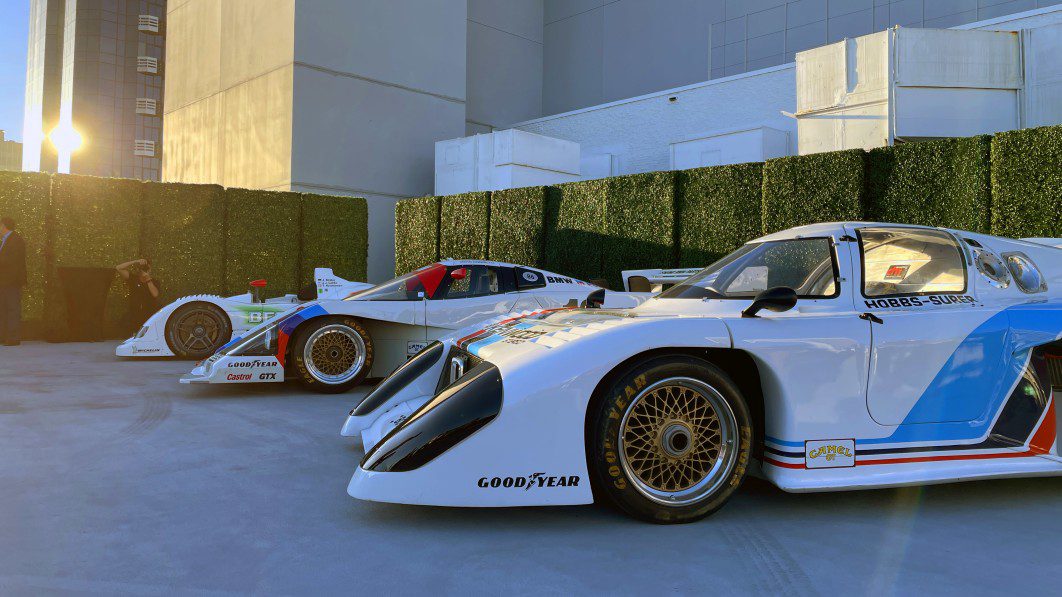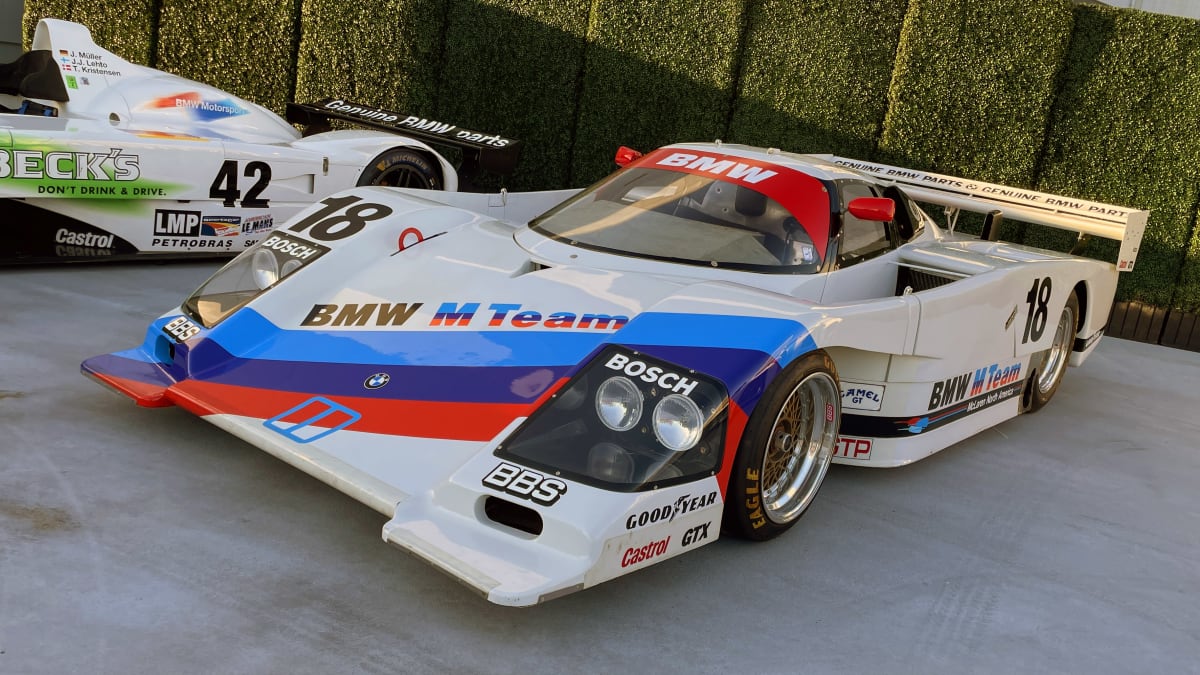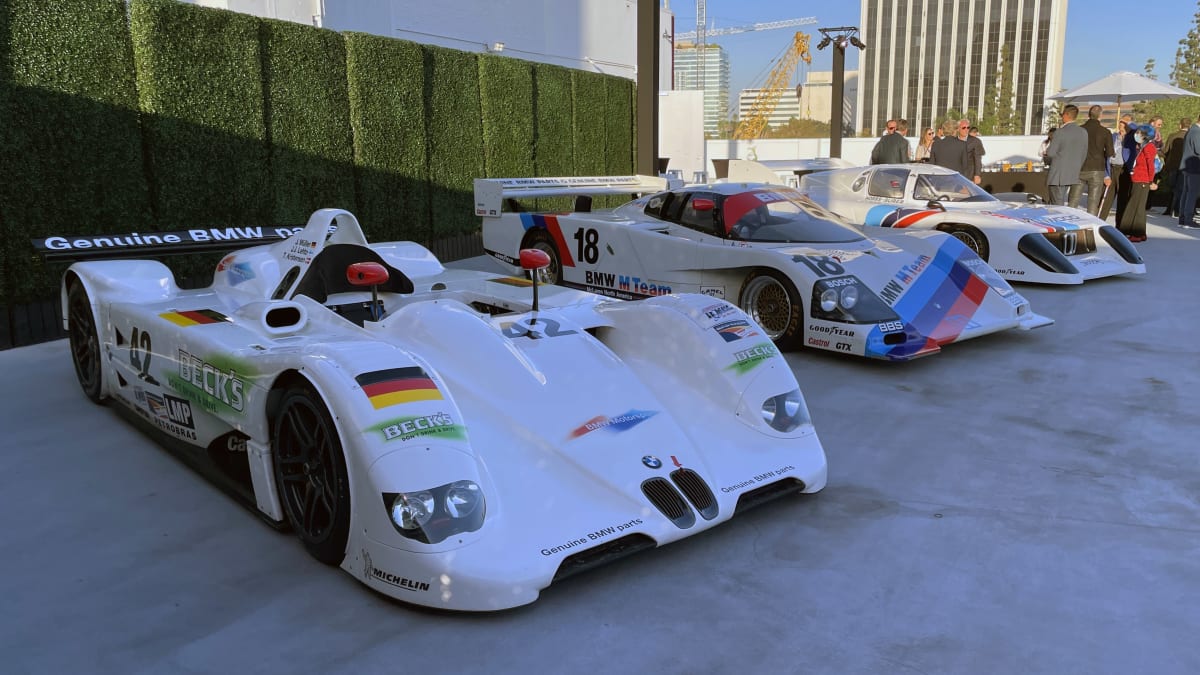BMW prototype racers through the decades

Last week BMW revealed its M Hybrid V8 LMDh race car. When it makes its maiden track outing in January 2023 at the 24 Hours of Daytona, it’ll be BMW’s first prototype race car in nearly a quarter century. At the car’s unveiling in Los Angeles, the company brought out three prototype racers from its heritage collection to show the progression.
BMW M1C
The 1981 BMW M1C is considered by many to be the first IMSA GTP car, though there is some debate on the matter. Created for the newly established Grand Touring Prototype class, it made its debut at Riverside Raceway in 1981. Originally it mated a BMW M1 3.5-liter inline-six with a March chassis. It was quite a departure from BMW’s contemporary race cars. The M division was established in 1972 to race the 3.0 CSL, then the M1. The M1C had no road-going counterpart and was the first “wing” car built by BMW.
However, compared to some of the V8-powered cars like the Lolas, it didn’t have enough power. The team then switched to a version of BMW’s 1.5-liter turbo four, which would go on to win the 1983 F1 championship in a Brabham chassis with Nelson Piquet behind the wheel.
The M1C was campaigned for just one season and unfortunately never won a race due to reliability issues. When it worked, it was fast, and it did qualify for pole position at Lime Rock.
Aside from the Alpine White body with M colors, there isn’t much to distinguish this car as a BMW. Except for the grille, that is. Originally, the car had a more integrated kidney, but the piece flew off during a race. The BMW motorsports manager at the time was adamant that it must have company branding so, as the story goes, he went out to the parking lot and grabbed the grille off his wife’s 320i. At the M1C’s next pit stop, he quickly attached it and sent it back out to race.
Eventually, a fan found the missing piece and returned it. But the 320i grille is how the car finished the season, so that’s how BMW’s heritage collection has kept the car, even though they have the correct part.

1986 BMW GTP
The 1986 BMW GTP cars were built from March 86G chassis and powered by a 2.1-liter variant of the aforementioned Formula 1 turbo four. Tuned by McLaren North America, it is said that power could be dialed up to over 1,000 horses, but in this guise it was tuned for about 700. It featured nominal styling cues from BMW road cars, like taillights from a 325i and a kidney grille (an appliqué, this time).
Progress was slow in the GTP, but towards the end of the 1986 season the GTP won the 6 Hours at Watkins Glen. It seemed that the team’s fortunes were on the upswing, but it was too late. Higher-ups decided to cancel the program.

1999 BMW V12 LMR
The BMW V12 LMR is the company’s most successful prototype to date. It raced on both sides of the Atlantic, in Le Mans and in the ALMS series, never retiring a single race. The chassis was developed by Williams, running a 6.0-liter V12 similar to the one found in the McLaren F1 and F1 GTR. Output rang in at about 700 horsepower.
BMW says they interpreted the rulebook a little different than the other teams. Most built a roll hoop that would encompass both driver and “mechanic” as tradition from the old days of Le Mans. BMW built theirs to cover the driver only. There was some deliberation over the design, but in the end the sanctioning body approved it and it became a dominant car that year.
The car displayed at the M Hybrid V8 debut won the 12 Hours of Sebring. Its sister car, which is stored in Munich, won the big daddy of them all, the 24 Hours of Le Mans. That car even beat the odds-on favorite, the Toyota GT-One,
Since then, BMW has taken a break from prototype racing. Next year, the M Hybrid V8 will rekindle that fire. We look forward to seeing how it fares against Porsche, Acura and Cadillac.
Related Video:



